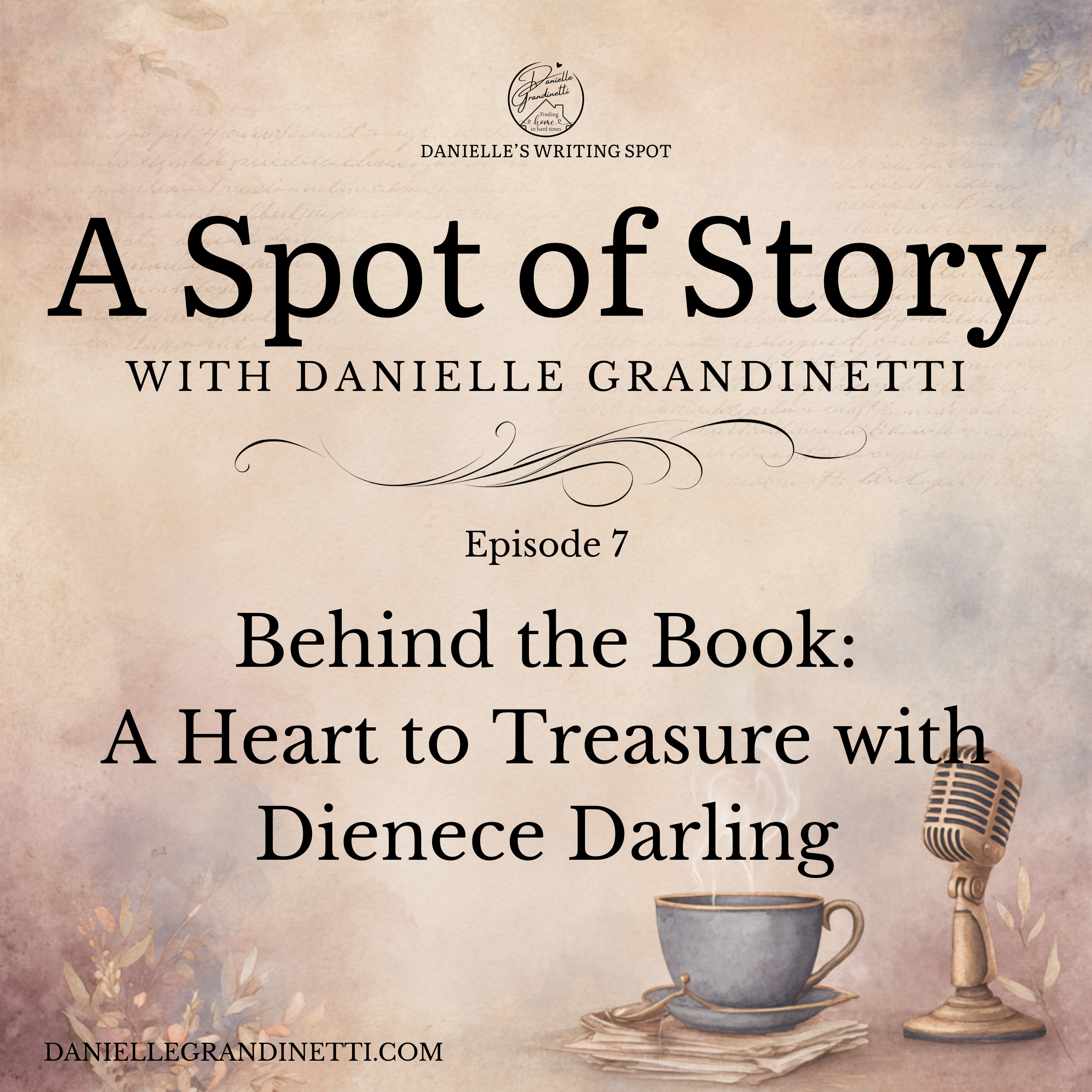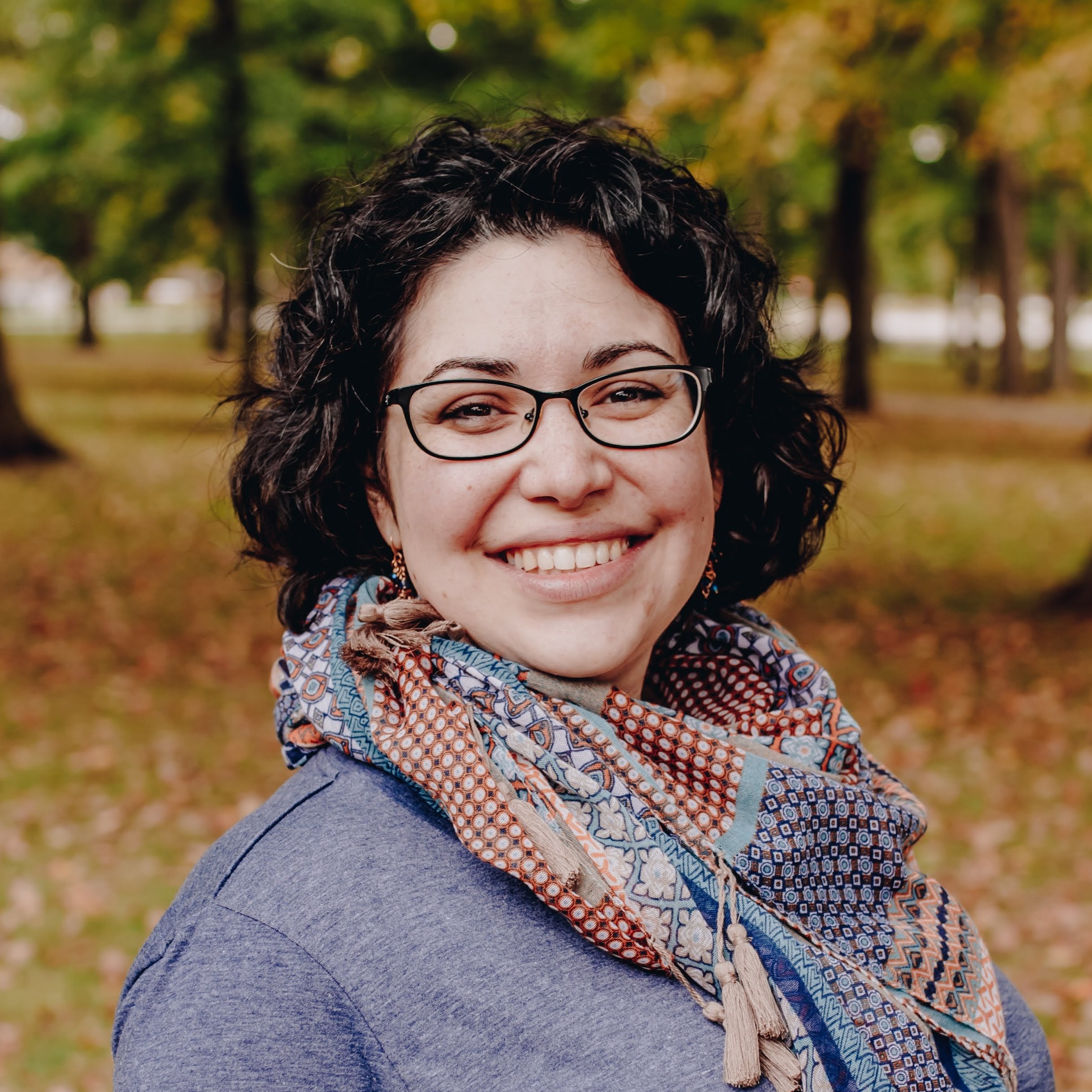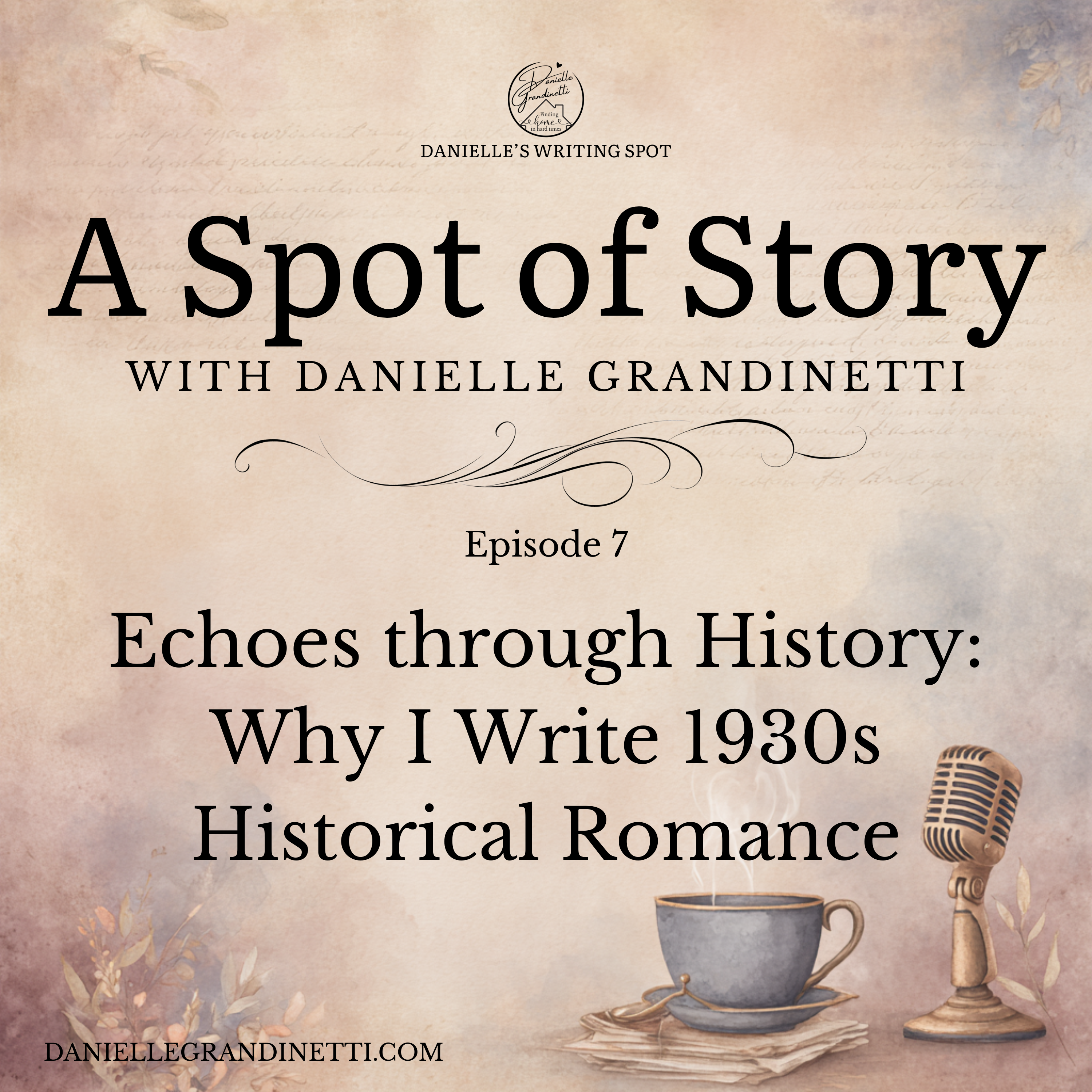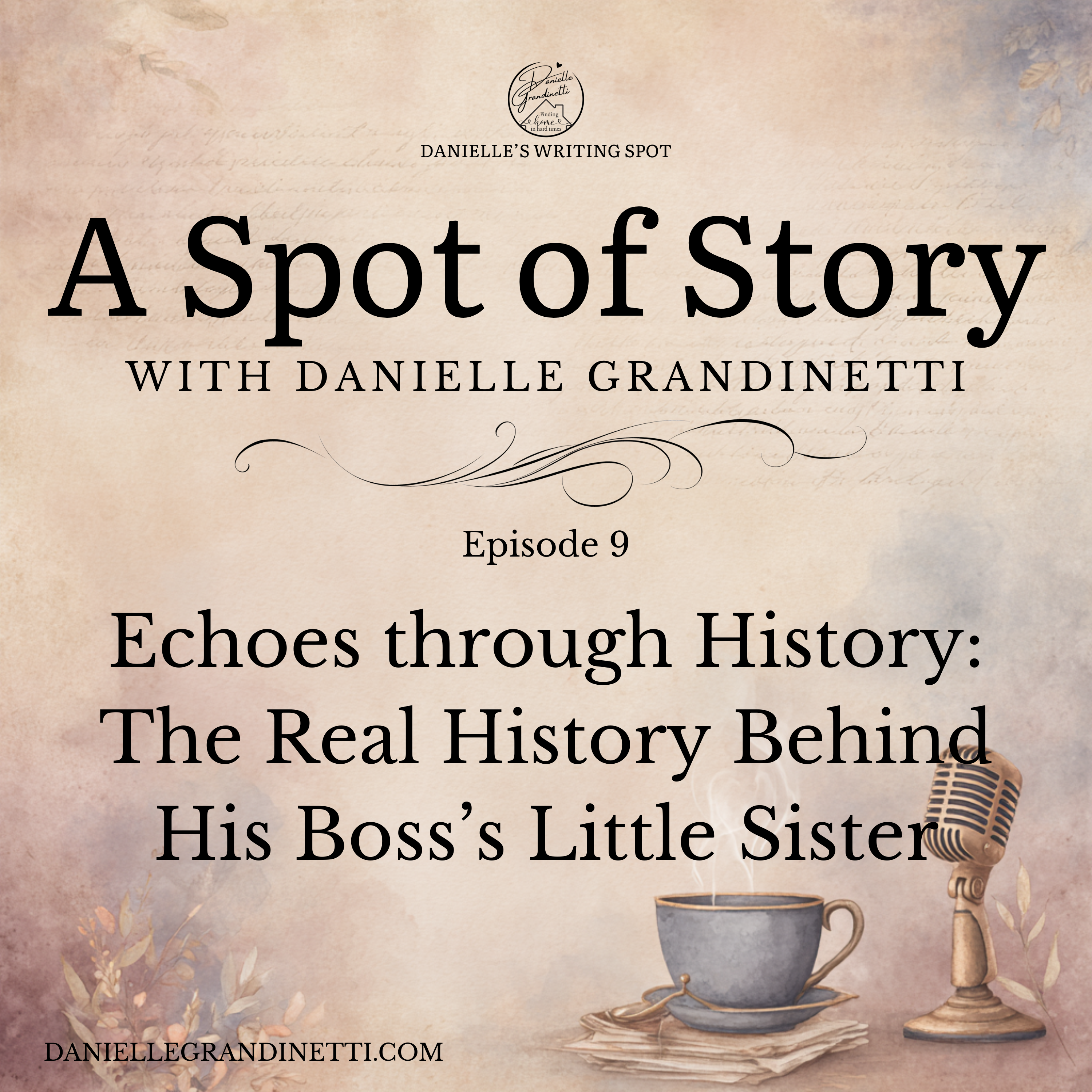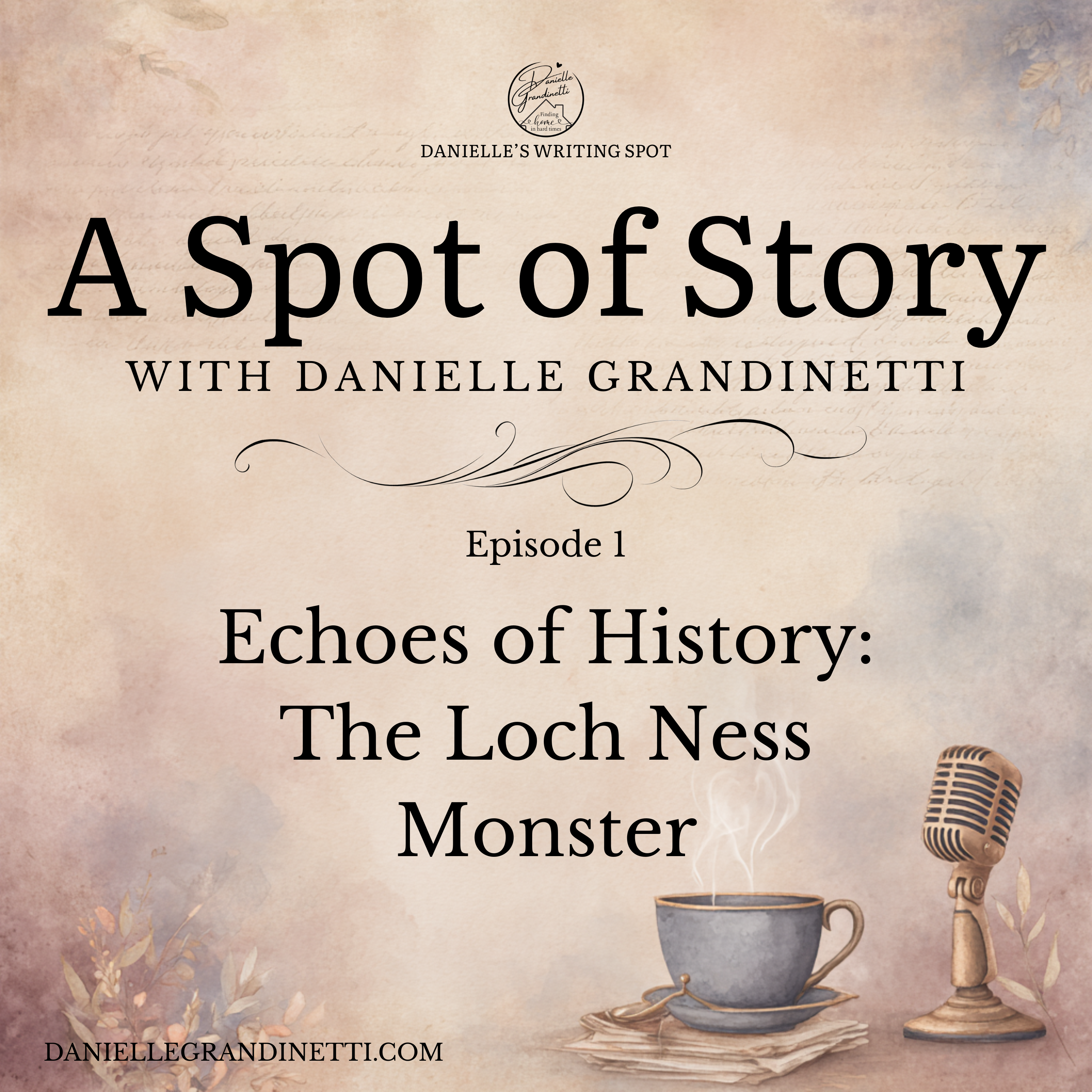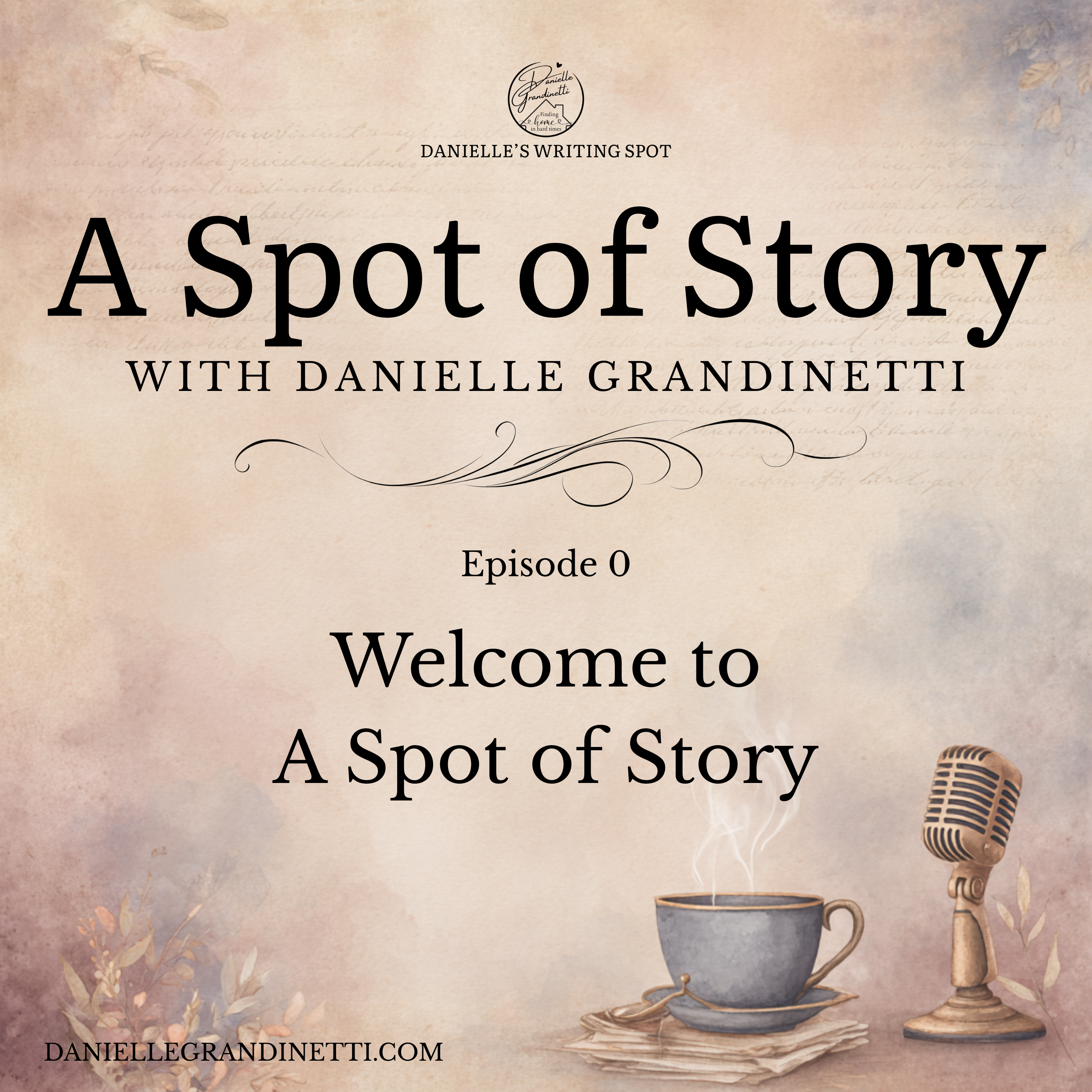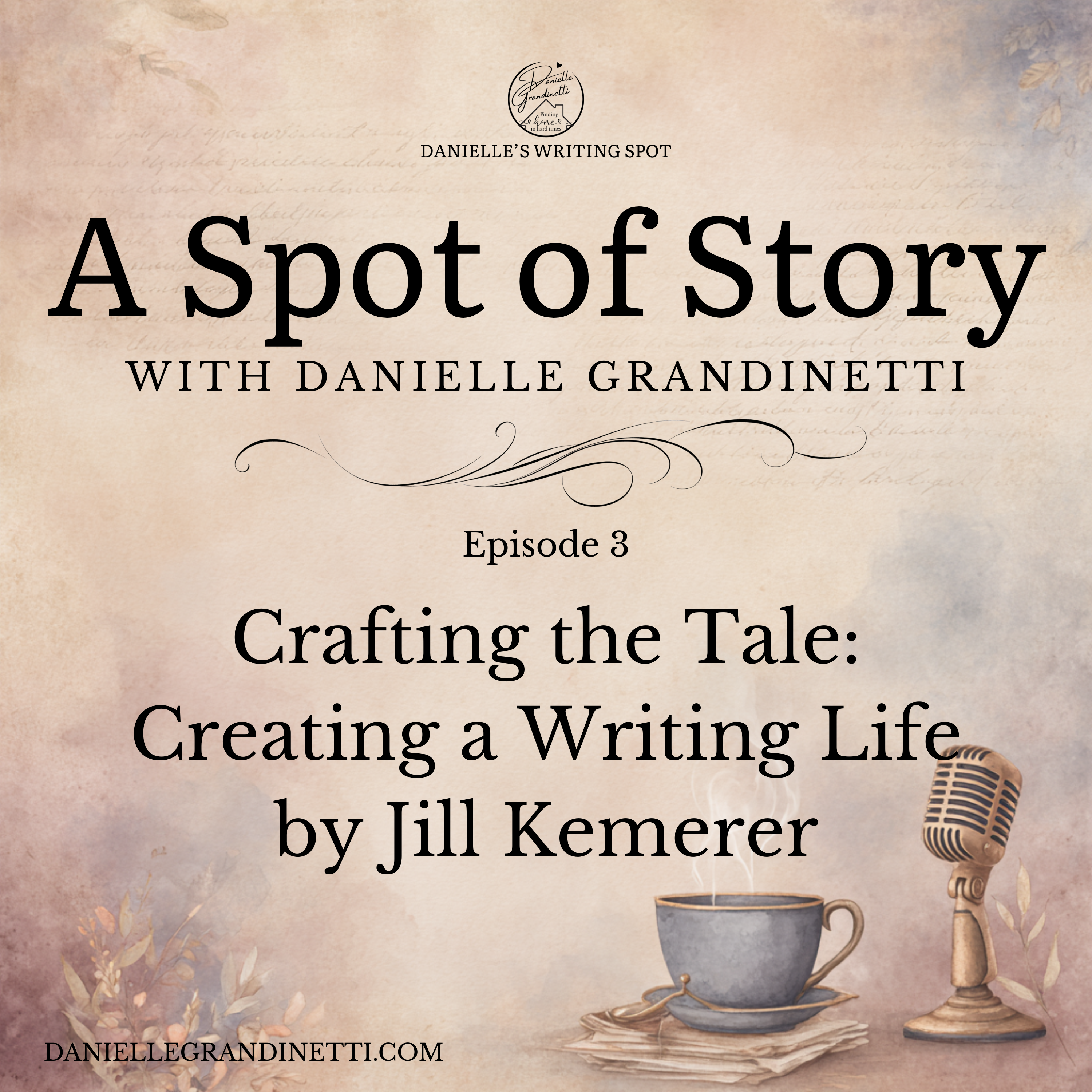Episode Transcript
Danielle Grandinetti: [00:00:00] Welcome to A Spot of Story with Danielle Grandinetti. Cozy up with your favorite beverage as we chat about sweet romance, thrilling suspense, and fascinating history. Perhaps you'll find your next read in one of these stories.
On this episode of A Spot of Story, I'm chatting with Dienece Darling, a former Georgian Bell turned Aussie. Dienece Darling loves writing Christian historical fiction and reading paperbacks whenever she can.
Dienece Darling, I'm so excited to have you here today.
Dienece Darling: Thank you for having me.
Danielle Grandinetti: You're welcome. Dienece is all the way in Australia. So the time difference between the two of us—we are actually talking on two separate days, which I think is just so cool. [00:01:00]
Dienece Darling: Yes, it gets a little bit tricky sometimes, but—
Danielle Grandinetti: Absolutely. Absolutely. So, as my blog is all about helping readers find new authors, and so it's all about bringing readers together, I love to start with a question about you as a reader. What are you currently reading right now?
Dienece Darling: Well, I'm in between fiction books. I just finished an ebook, and I tend to have a lot of books going at once. The ebook I just finished was In the Shadows of Sacrifice by Heather Taber. When you sign up to her newsletter, you get that book. I just finished that one. The paperback I just finished was A Scheming in Parliament by Erica Vetsch. But what I'm currently reading right now, since I haven't picked up another fiction, is actually nonfiction. I'm reading Defiance: The Life and Choices of Lady Anne Bernard by Steven Taylor. It's a resource for a possibility of what I might [00:02:00] be writing next year.
Danielle Grandinetti: Ooh, that sounds fun. I love it. Well, before we get into next year's book, let's talk about this year's book. Tell me about A Heart to Treasure.
Dienece Darling: So we have a clergyman’s son, and we have a draper’s daughter. They met when he needed a new change of clothes and came into the shop, and she was in the middle of trying to rescue a stray cat that had wandered in. She gets stuck because her ladder falls, and she gets stuck, and he helps her down, and then he helps rescue the cat. And that’s where they meet. And even though he gets his new change of clothes, he keeps showing up at the shop because he wants to see her. But they’ve had quite a few bumps along the road. He’s known from the day he met her that he wanted to marry her, but she’s not a lady, and his father’s very strict. So he has been trying to figure out a way to [00:03:00] convince his dad to let them get married. A Heart to Treasure starts less than two weeks before their wedding, but things are still not quite smooth sailing yet.
So there’s “Are we going to actually get married on the day we’re supposed to be getting married, or is something gonna happen?”
Danielle Grandinetti: Ooh—what? Well, I want to say intrigue, but intrigue sounds like suspense. But the “is it gonna happen?”
Dienece Darling: Well, this time there’s a little bit of intrigue in this book. I don’t typically write that one, but this one does actually have a little intrigue—who did it, what happened—a bit more tense.
Danielle Grandinetti: So, what does a day in the life of your characters look like?
Dienece Darling: Well, both of them are in the middle of a transition. So not only are they about to get married and things are going to change, but both of them—she used to be a draper’s, she used to work at Dad’s drapery. Now that she’s going to marry a gentleman, everybody tells her she has to stop being a common shopkeeper, and she has to start being a lady. And she doesn’t [00:04:00] like it. She hates sewing, and she hates sitting, and she hates being still. And who wants to talk to a former shopkeeper’s daughter? “Nobody does. I don’t get visitors, and I don’t have anybody to visit ’cause all of my friends are doing what I used to do.” So she’s frustrated. “I love Obadiah, but I don’t really like the fact that I’m going to be a lady.” She’s still trying to figure out her place in the world and what she’s going to do as a lady.
Both of them are in little towns just outside of Canterbury, but there’s not a lot to do there for ladies. And my particular character, Eliza, does not like the quietness. She wants to do stuff, and she loves numbers, and she misses being a part of the accounts, and she misses all the action. So she’s still trying to figure out her place in the world.
And Obadiah is also a little bit stuck. He’s just about to take orders and join the church, but he’s currently at odds with God. “I really thought God wanted me to do this, and things went bad,” and [00:05:00] so he’s frustrated. “If you asked me to do this, God, why did it all go wrong?” And so he’s not doing what he used to do, which—he used to spend a lot more time in prayer and in Bible study because he belongs to the Methodist Society, which at this point is still in the Church of England. They’re just about to split, but they haven’t split yet. But they’re still within the Church of England, and they had a lot of methods—that’s why they’re called Methodists—a lot of reading the Bible, a lot of praying. And he used to do all those things before he got mad at God.
So he is currently trying to figure out what he’s up to, because he is about to join the church, but he is kind of not talking to God, which makes things a little bit interesting. So how do you preach if you’re not so sure you’re happy with God right this present moment? But he is still trying to figure himself out.
But he also has a secret that he doesn’t think anybody knows: he has a forge out in the middle [00:06:00] of the forest. Blea—where he lives—is right near the Blea, is what it’s called. It’s a great big forest, and he loves going out there and making metal sculptures. But there are only two people that he knows of who know, but there’s actually somebody else. He just doesn’t know that they know.
Danielle Grandinetti: Oh, this is sounding like an interesting story.
Dienece Darling: Yes. That’s his day. He is definitely a gentleman of leisure. “There’s nothing to do because I used to talk to God, and I don’t talk to God anymore. I’m about to join the church, but I haven’t actually joined the church yet.” But what he does tend to do is make metal sculpture. So that’s about all he has to do at the present moment while he’s figuring himself out.
Danielle Grandinetti: Love it. Love that.
So, with all of these really fun little moments, what was your favorite scene to write, and why?
Dienece Darling: My favorite bit that is still mostly intact of what I first wrote down is—because, as a writer, you’ll know that they change—but this one’s pretty much close to what I originally wrote: an [00:07:00] apology letter. So, Obadiah stuffs up. He stuffs up royally, and he needs to write an apology letter. And it was just one morning during my writing sessions with my writing group—I sat, and I wrote an apology letter. Both of them—he had to write two. And, yes, those were my favorite moments. I don’t know why—it all just came right out, and I haven’t changed much of it since. It was like, “Nope, that was it.” That’s awesome. And I don’t know why—I really enjoyed writing that apology. I did.
Danielle Grandinetti: I love that. It’s awesome. It sounds like there’s just a lot of history—you’ve kind of touched on it a little bit. What was some of your favorite, unique research that you had to do for this particular story?
Dienece Darling: Well, this one’s really tricky ’cause it’s set in the 1790s, when—for context—Jane Austen is just coming into society. So they’re used to Jane Austen in Regency [00:08:00] when she was in her thirties, forties. But this is Jane Austen when she was in her teens and early twenties. So what was England like? And most people don’t write about what was England like when the Regency fashions were just being invented—where were the sleeve lengths, where were the waists? Was it the empire waist yet? Was it not the empire waist yet? And that was really tricky to try and find. I needed a lot of Georgian books, a lot of Regency books, a couple of Jane Austen’s letters. Most of those don’t start, I think, till 1796, and that’s two years after my book. But it could still give me a little bit of insight—what was the mindset, what were the fashions? ’Cause they changed like the wind. Through the 1790s, everybody was inventing this and inventing that.
And I thought, “Why not write about what it was like in England when Jane Austen was making her debut, not when she was middle-aged and, you know, an old maid [00:09:00] not gonna be able to do anything anymore? Let’s write about what it was like when it all started.” But it was very hard to find research for that.
Danielle Grandinetti: Yes, yes. I can imagine. I can imagine. So what was a bit of research that you didn’t get to include in the story?
Dienece Darling: That would be the jail. So—another intrigue part—someone ends up in jail. You just don’t get to find out who. But I was doing so much research, and it was so exciting. I actually found reports from the jail at Canterbury of someone from the time. I had to combine two, ’cause the first report was 1784 and the second report was 1812. And I’m like, “I’ve gotta figure out the commonalities.” You’ve gotta work on the wording of, “Okay, this just said it was only just put in, so obviously it wouldn’t be there in 1790,” but you’re working it out and figuring out and going through. Somebody did a walkthrough of the jail so I could try and see, “Okay, what does it look like in there?” And [00:10:00] the only problem was there are only two scenes in there. So, as much as you want to talk about all the stuff that you learned about the jail and what their food rations were and who they used to hire to get their food and all these fun stuff, they don’t end up in the book, because it wouldn’t make sense if they were in the book. It’s really frustrating because I’m like, “Oh, it was so cool.” I mean, the one who wrote the report in 1812—he was ranting about the conditions in the jail. And because he was ranting about it—he was really miffed about how terrible it was—there’s so much information about what it was like and the conditions and what they did and didn’t have. And I’m like, “This was so cool,” and I can only use little bits of it. So that’s what didn’t all make it in the [00:11:00] book.
Danielle Grandinetti: Yes, yes. That’s why I love asking that question, because so often there’s this nugget that’s so cool. And I love learning what those things are.
Dienece Darling: I’ll try and include a link somewhere. I usually put stuff on my blog to talk about the things that I don’t get to talk about in the book. So I put that at the end of my book in my author’s note: “If you want to know more about it, click on this,” and these will be all the little blogs about things I learned and things I studied.
Danielle Grandinetti: Oh, great idea.
Dienece Darling: You can read about it in the blog.
Danielle Grandinetti: You can still learn about it. That’s awesome. That is awesome. So, backing up a little bit—what was the inspiration behind this story? Why this story?
Dienece Darling: Yes. So initially I had planned on writing the story when the Methodists split from the Church of England. And it was because I’d gone through a church split, and it was a [00:12:00] really, really painful time, and I could see—going afterwards—I could see, “Okay, what did I do that didn’t help?”
Danielle Grandinetti: Right. We’re all humans.
Dienece Darling: We’re all human. What did I do that didn’t help? And I thought, “Well, wouldn’t it be fun if I had one person think that you ought to split from England and another person think you shouldn’t?” But as the story progressed, I realized that that wasn’t the story that God wanted me to tell. And so I do still have my characters on the opposite side of an issue, but it’s not the church split in this particular instance. But that was the original inspiration. It was a way of working out the pain that I felt when this happened. And it still talks about that pain whenever something falls apart. “What did I do? What could I have done better?” And the regret that you have for the decisions that you made.
Danielle Grandinetti: That actually kind of leads into one of our last questions: what encouragement do you hope readers [00:13:00] will take away from your story?
Dienece Darling: The theme of the book is “Honor thy father.” And so I work—there are a lot of issues in the book—but “Honor thy father” covers a couple of things. So, with Eliza, she has a good father who makes a terrible mistake. And with Obadiah, he has a bad father. And how do you honor them? So with Eliza—how do you honor a father that you’re really, really mad at at the present moment? And for Obadiah—how do you honor a father that’s not acting honorably?
And, lastly, it ties into “Honor thy heavenly Father” as well. So, in amongst all your trials and what’s going on—how do you honor Him? And remembering—for Eliza, one of her lessons is she’s so used to being comfortable with her father that she takes everything to her heavenly Father without realizing that her heavenly Father—while she [00:14:00] has freedom to go—He’s still worthy of her honor. And she needs to learn how to honor her heavenly Father instead of just rail at Him. And for Obadiah, it’s that issue that he’s still starting from the start of the book—that old issue from long before. “Why did You do that?”
Danielle Grandinetti: Yes. These sound like—the way you talk about them—the story sounds so real. The characters and the things that they deal with are such everyday things that modern people still wrestle with, even though the story is set, you know, 200 years ago.
Dienece Darling: Yeah. I’m terrible at math—sure.
Danielle Grandinetti: A while ago—way back.
Dienece Darling: That’s what I like to write about. I like to write—even though it’s escapism, you get the whole “what was it like back then”—the issues that they deal with. I prefer writing something that I’ve dealt with myself. [00:15:00] And people are people, no matter how long ago they lived. And so that’s what I like to write about—something that you can walk away with today that’s still something you need some help with today. And some encouragement to think about it.
Danielle Grandinetti: Yeah. Right, right. I love that. That’s really, really great. Really great.
Well, Dienece, thank you so much for joining me today. If my readers want to find you online—find those blog resources that you mentioned—where can they find you?
Dienece Darling: Well, it helps if you know how to spell my name, ’cause as long as you can spell my name, you will find me. So my name is spelled D-I-E-N-E-C-E, then it’s “Darling” as in “sweetheart.” ’Cause I know some people always ask me—for some reason, I think I pronounce it funny—and they’re like, “What last name are you saying?” “Darling—the sweetheart.” The “darling.” That’s me. You can find me at dienecedarling.com. That’ll have all of my links [00:16:00] on it, as well as my blogs. You can also find me on Facebook, Dienece Darling, Author. I’m also on Instagram and on X as well. Okay? So that’s where I am, and you can find me and find my little bits to see what I’m up to.
Danielle Grandinetti: Wonderful. Wonderful. Yay. Thank you, Dienece.
Dienece Darling: And my newsletter, of course, has all of my extra—
Danielle Grandinetti: Oh, fun.
Dienece Darling: They actually—a couple of my subscribers—named characters in my book this time, ’cause I had a—I have characters tell me what their names are going to be. So I had a whole bunch of people write in, and I went, “You know, everybody that sent a suggestion—your name is in the book somewhere.”
Danielle Grandinetti: I need to go join your newsletter because that sounds really cool. I think I’m going to have to go pick up the book, ’cause I am extremely intrigued right now. Thank you, Dienece, for joining us today.
Dienece Darling: Thank you so much for having me.
Danielle Grandinetti: Thank you for listening to A Spot of Story with Danielle Grandinetti. We hope you enjoyed today’s [00:17:00] conversation. Let us know by leaving a comment below and be sure to subscribe so you don’t miss an episode. Discover more information about today’s book by visiting A Spot of Story online at daniellegrandinetti.com/podcast.
Happy reading.
